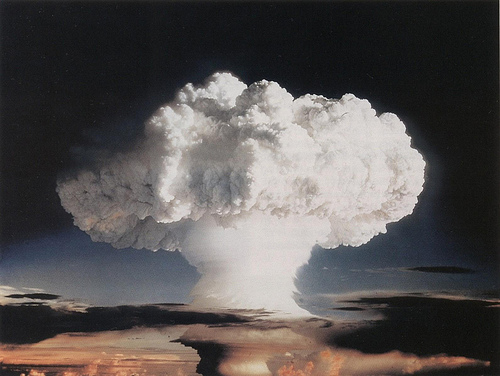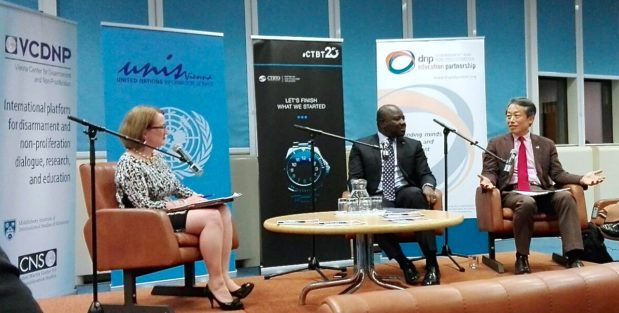
On 6 December 2016, the Executive Secretary of the Preparatory Commission for the Comprehensive Nuclear-Test-Ban Treaty Organization (CTBTO), Lassina Zerbo, and the United Nations Under‑Secretary-General and High Representative for Disarmament Affairs, Kim Won-soo, engaged in a conversation, moderated by the Executive Director of the VCDNP, Laura Rockwood, on why youth should care about ending nuclear tests. The event was jointly organized by the CTBTO, the United Nations Information Service (UNIS), the United Nations Office for Disarmament (ONODA) and the VCDNP. The discussion was livestreamed, a recording of which can be viewed here.
The CTBT bans all nuclear explosions – everywhere and by everyone. The CTBTO is equipped with a unique International Monitoring System (IMS) and International Data Centre (IDC). Unfortunately, the treaty is not yet in force: eight remaining States, listed in Annex 2, have yet to sign and or ratify.
The conversation was kicked off with a question by Ms. Rockwood: why should the youth of today care about the CTBT and ending nuclear tests when only one country, North Korea, is still testing?
Mr. Zerbo emphasized that the younger generation should care about the CTBT because it is their treaty. Youth will shape the future and can decide whether to live in a world with or without nuclear tests. And even though no other State is currently testing except one, the monitoring system of the CTBTO should remain in place as a deterrent. “If you test, you’ll get caught”, said Mr. Zerbo, who stressed the importance of having an impartial international organization, capable of detecting nuclear tests.
Mr. Won-soo spoke of the entry into force of the CTBT as a “first step towards eliminating nuclear weapons”. The recent UN Security Council resolution 2310 (2016), which reaffirms the crucial role of the CTBT, is a step in the right direction, but is not enough: the treaty’s entry into force is necessary to secure permanent, legally-binding obligations by States not to test.

Participants in the event, in person and on line, were invited to engage with the speakers.
William Potter, Director of the James Martin Center for Nonproliferation Studies, opened the discussion by asking what the CTBTO and the UN were doing to advance non-proliferation education. Mr. Won-soo spoke of the UN Disarmament Fellowship Program, the oldest education initiative in this field, which he would like to expand as much as possible. Mr. Zerbo said that, while the CTBT is not directly engaged in education, he strongly believes that the youth should be involved in disarmament education at an early stage, in order to be better prepared for becoming policymakers.
The following discussion addressed issues ranging from who could (or should) be the next outlier country to ratify, to other scientific applications of the data collected by the CTBTO and the possibility of amending the treaty in order to permit use of technologies such as satellite imagery.
One of the final questions that was raised during the discussion was what concrete actions young people could take to promote the entry into force of the CTBT. Mr. Won-soo urged young citizens to write letters to their representatives as an effective way of making their voices heard. Mr. Zerbo underlined the importance of the younger generations maximizing the use of social media to raise awareness of the CTBT. In that regard, he noted that the second nuclear test by North Korea this year had triggered less interest than the first, in large part, in his view, because complacency had set in. Active engagement by the youth could reduce that complacency, heighten awareness of the importance of banning all nuclear testing and increase pressure on States to secure the permanent entry into force of the CTBT.
Featured Photo by The Official CTBTO Photostream 